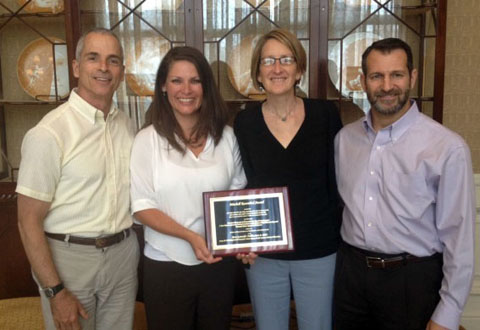Center of Innovation on Disability & Rehab Research (CINDRR)
2013 Mitchell Rosenthal Award Recipients

John Whyte, Risa Nakase-Richardson, Flora Hammond, and Joseph Giacino with award
Awarded by the National Institute on Disability and Rehabilitation Research (NIDRR) Traumatic Brain Injury (TBI) Model System Programs for "Best Scientific Publication" using the NIDRR-funded TBI Model System National Database., the current Mitchell Rosenthal Award is given to papers published in 2013. Fourteen papers representing NIDRR-funded TBI Model System Programs were reviewed. The award was named after Mitchell Rosenthal, PhD, who was involved in the very early stages of development and longitudinal funding of the TBI Model Systems since inception, almost 25 years ago. The NIDRR-funded TBI Model System has enrolled approximately 12,000 persons with TBI who are followed throughout the years of their recovery; the VA-funded TBI Model System has enrolled over 500 Veterans and service members with TBI.
The winning paper, http://www.sciencedirect.com/science/article/pii/S0003999313004061, was published in an issue devoted to persons with Disorders of Consciousness (DOC) published in the October 2013 issue of Archives of Physical Medicine and Rehabilitation. The article highlights the percentage of TBI patients admitted to inpatient rehabilitation with an inability to follow commands (denoting severe neurologic dysfunction) who subsequently were able to regain independence in functional activities as measured by the FIM at 1, 2, and 5 years post-injury. It showed that 8 percent to 21 percent were functioning independently at the time of discharge, and depending on the functional variable, up to 85 percent were independent after five years. Findings document that patients improve long after severe TBI and prolonged DOC.
Additional authors of the paper are S. McNamee, K. Kalmar, BD Greenwald, SA Yablon.
The VA Polytrauma Rehabilitation Center and NIDRR TBI Model Systems Partnership
The Veterans Affairs Rehabilitation Program Office developed an inter-agency agreement with the U.S. Department of Educations' National Institute on Disability and Rehabilitation and Research (NIDRR) TBI Model System Program to manage a database of rehabilitation outcome variables. The TBI Model System Program is a longitudinal multi-center study which examines the course of recovery and outcomes following the delivery of a coordinated system of acute neurotrauma and inpatient rehabilitation in the private sector. Currently, the TBIMS program has documented outcomes for over 12,000 persons up to 25 years post-injury. The knowledge and expertise of this competitively funded system was adapted for characterization and monitoring of outcomes for persons with TBI treated in the VA Polytrauma Rehabilitation System of Care. The hub and spoke system of care consists of five Polytrauma Rehabilitation Centers (Tampa, Minneapolis, Richmond, Palo Alto, San Antonio) and supporting Polytrauma Network Sites throughout the VA. Dr. Risa Richardson (Tampa VA-TBIMS, principal investigator) serves as the liaison between the VA-TBIMS and NIDRR-TBIMS through attendance at biannual meetings with NIDRR TBIMS investigators and 4 other VA-TBIMS Principal Investigators. Since 2010, 541 Veterans and Service personnel with TBI (42% = mild, 11% = moderate, 47% = severe TBI) have been enrolled in this lifetime study with an annual follow-up at 1, 2, 5 and every 5 years thereafter. The VA-TBIMS infrastructure with its demonstrated history of successful enrollment is well positioned to improve VHA's knowledge of chronic TBI health.



















